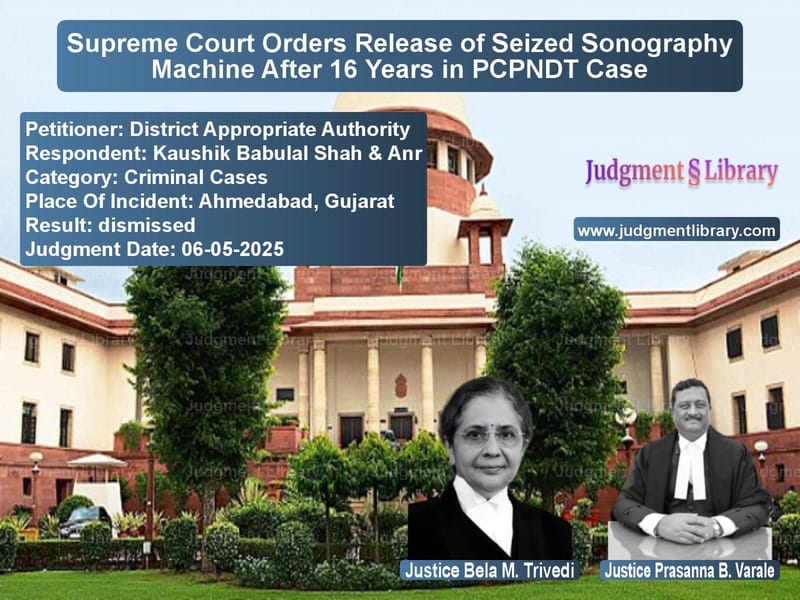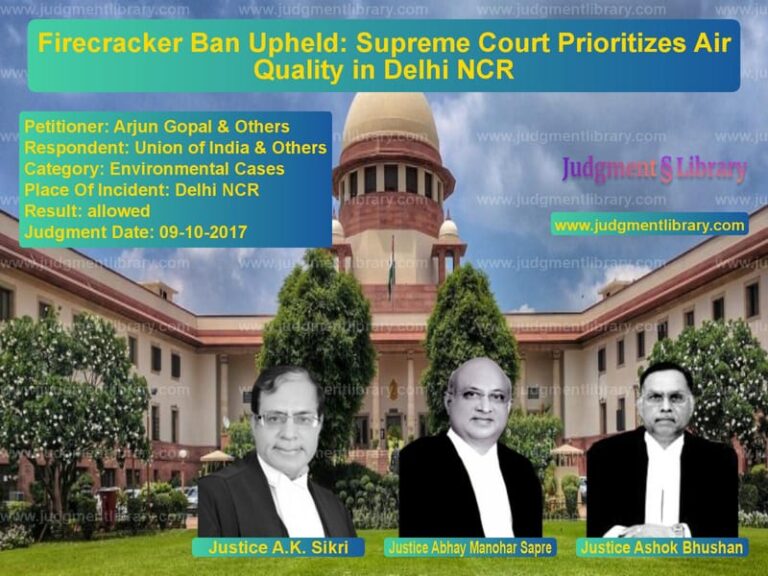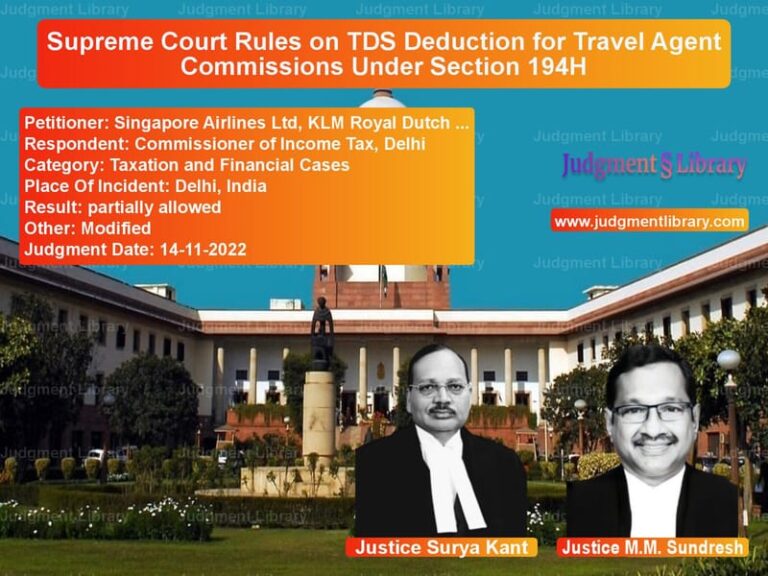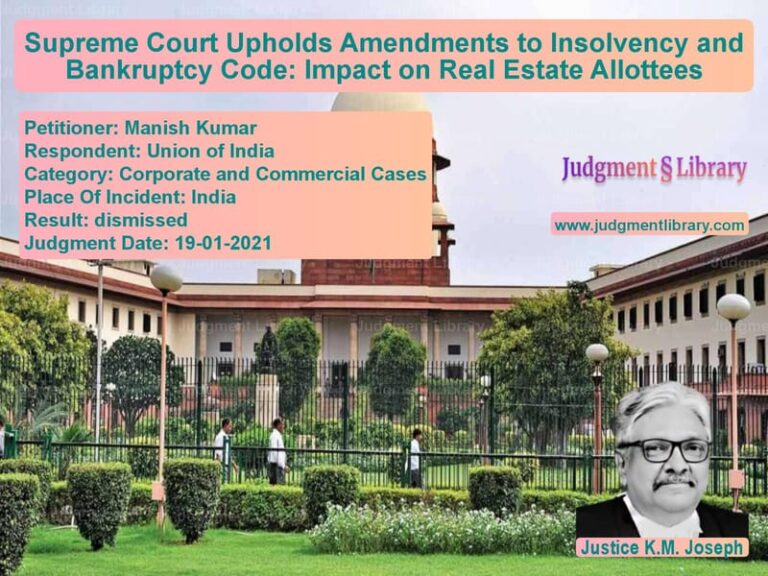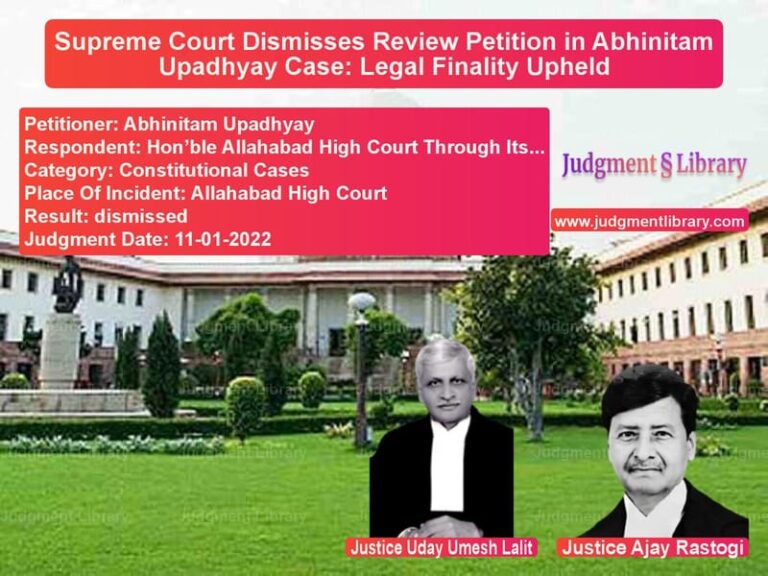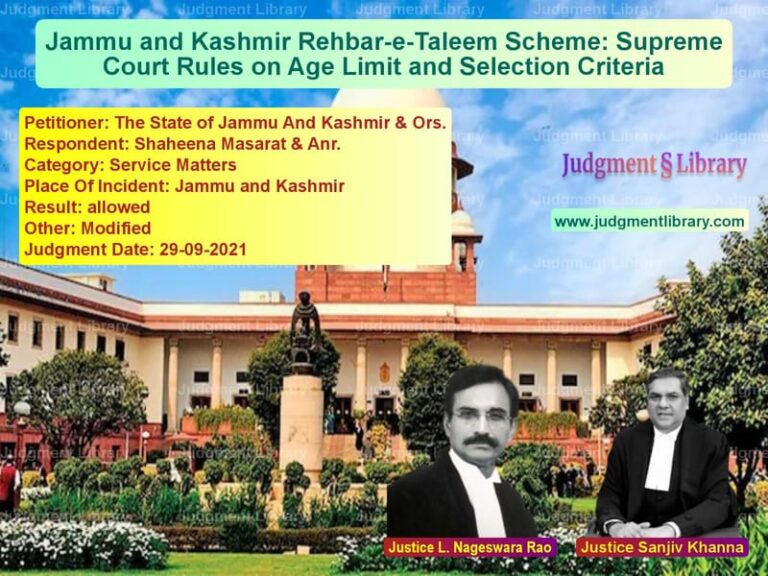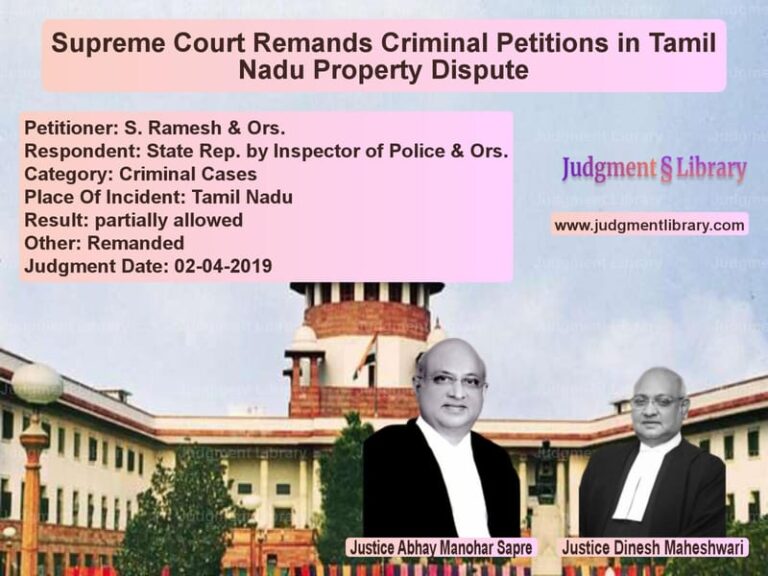Supreme Court Orders Release of Seized Sonography Machine After 16 Years in PCPNDT Case
In a significant ruling that balances the enforcement of anti-sex determination laws with the rights of medical practitioners, the Supreme Court of India delivered a crucial judgment on May 6, 2025, concerning the prolonged seizure of a sonography machine that had been sealed for sixteen years in a case under the Pre-Conception and Pre-Natal Diagnostic Techniques Act. The case of District Appropriate Authority versus Kaushik Babulal Shah & Anr. raised important questions about the reasonable duration for preserving seized medical equipment as evidence and the rights of acquitted individuals to resume their professional practice.
The legal saga began on May 26, 2009, when the District Appropriate Authority in Ahmedabad conducted a sting operation targeting Dr. Kaushik Babulal Shah at his Manthan Imaging Centre. During this operation, it was alleged that Dr. Shah had conducted a sonography test and disclosed the sex of the fetus as “male child” in exchange for Rs. 10,000. The authorities also discovered that Form ‘F,’ which is mandatory under the PC & PNDT Act, had been incompletely filled. Consequently, a case was registered against Dr. Shah under various sections of the PC & PNDT Act, and during the search and seizure operation, the sonography machine was sealed as case property.
What followed was a protracted legal battle that spanned over sixteen years, involving multiple rounds of litigation at various judicial levels. Dr. Shah initially approached the Gujarat High Court in 2009 seeking removal of the seal from his sonography machine. The Single Judge granted relief, but the Division Bench set aside this order and directed the Metropolitan Magistrate to decide the criminal case expeditiously. In a significant development, the Metropolitan Magistrate acquitted Dr. Shah of all charges on December 4, 2012, and directed the return of the seized property. This acquittal was subsequently confirmed by the Sessions Court on August 23, 2012.
Despite these acquittals, the sonography machine remained sealed. Dr. Shah then approached the High Court again in 2012, seeking removal of the seal in view of his acquittal. The High Court, in its order dated October 1, 2012, allowed the petition and directed the authorities to open the seal within fifteen days. The court observed that “considering the right of the present petitioner original accused regarding the use of the machine for his earning or livelihood or for his profession, it cannot be now deprived since he has been acquitted by two courts, that is, the trial court as well in appeal by the appellate court.” The High Court also provided a safeguard, allowing the authorities to keep their engineer present during the unsealing to retrieve any data from the machine.
The District Appropriate Authority challenged this order before the Supreme Court, arguing that the High Court’s direction to open the seal was contrary to Section 29 of the PC & PNDT Act. The appellant authority contended that “as per Section 29 of the PC & PNDT Act all the records and documents have to be maintained and preserved till the criminal proceedings are completely disposed of.” They emphasized that since their application for leave to appeal against the acquittal was still pending, the criminal proceedings could not be considered finally disposed of, and therefore, the sonography machine should remain sealed.
The respondents, represented by Dr. Shah’s counsel, countered these arguments by stating that “the Respondent has been acquitted by the Trial Court as well as the Appellate court of all charges that were levied against him.” They argued that the term “such proceedings” in Section 29 of the Act only applies to proceedings pending before the Trial Court and cannot be extended indefinitely to any other court. The respondents maintained that the application for release of the sealed machine was made only after the criminal proceedings had been finally disposed of through his acquittal by both the Metropolitan Magistrate and the Sessions Court.
The Supreme Court bench comprising Justice Bela M. Trivedi and Justice Prasanna B. Varale carefully examined the chronology of events and the provisions of the PC & PNDT Act. The court noted that the sonography machine had been sealed since 2009 and had remained in that condition for sixteen years. The judges observed that “No purpose would be served by accepting the submission of the learned counsel for the Appellant Authority to keep the machine sealed even after nearly 16 years.” The court further emphasized that “Not even any justifiable reason is coming forward from the Appellant Authority so as to why the sonography machine must be kept in a sealed condition for an indefinite period except an insistence that the proceeding is still pending and had not attained finality.”
The Supreme Court’s analysis delved deep into the interpretation of Section 29 of the PC & PNDT Act, which deals with the maintenance and preservation of records. The provision states that records must be preserved for two years or such period as may be prescribed, with an additional proviso that if criminal proceedings are instituted, the records must be preserved till the final disposal of such proceedings. The court noted that “in Section 29(1) there is no prescription of a specified period for which such record needs to be preserved.” The judges observed that the words used are either ‘two years’ or ‘as may be prescribed,’ and in Section 29(2), the words used are ‘at all reasonable times.’
The court made a crucial observation about the practical implications of keeping medical equipment sealed indefinitely: “Another aspect of consideration is that keeping the sonography machine in a sealed condition for a further indefinite period would only result in making the machine either useless or worthless.” This recognition of the economic and professional harm caused by prolonged seizure demonstrated the court’s understanding of the real-world consequences of legal procedures.
The Supreme Court also referred to Section 451 of the Code of Criminal Procedure, which deals with the custody and disposal of property pending trial. This provision gives courts the discretion to release property if it is subject to speedy and natural decay or if it is otherwise expedient to do so. The court cited its earlier decision in Ashok Kumar v. State of Bihar & Ors., where it had held that “We do not think it necessary to keep the vehicle in the compound of the court indefinitely for a very long time till the final disposal of this case. It is more advisable to entrust it to the registered owner on behalf of the court under certain conditions.”
The Supreme Court upheld the High Court’s order, noting that it contained adequate safeguards for the appellant authority’s interests. The High Court had directed that if any data from the machine needed to be retrieved, the authority could keep their engineer present during the unsealing. The Supreme Court found this arrangement reasonable and sufficient to protect the evidentiary value of any data that might be recovered from the machine.
In its concluding remarks, the Supreme Court emphasized that “no justifiable reason worth consideration is coming forward from the appellant authority to keep the sonography machine in a sealed condition for an indefinite period till the conclusion of the proceedings.” The court dismissed the appeals, finding them devoid of merit, and thus brought closure to a legal battle that had kept a medical professional’s equipment sealed for sixteen years.
This judgment represents a significant development in the interpretation of the PC & PNDT Act, particularly regarding the balance between enforcing the law against sex determination and protecting the rights of medical practitioners. The Supreme Court’s reasoning demonstrates a pragmatic approach to evidence preservation, recognizing that while the fight against illegal sex determination is crucial, it cannot justify the indefinite seizure of medical equipment, especially when the accused has been acquitted by two courts. The judgment also highlights the importance of timely disposal of cases and the need for proportionality in the enforcement of legal provisions.
The ruling serves as an important precedent for similar cases where medical equipment remains seized for extended periods, potentially affecting the livelihood of healthcare professionals and the availability of medical services. By emphasizing reasonableness and proportionality, the Supreme Court has provided much-needed clarity on the interpretation of Section 29 of the PC & PNDT Act, ensuring that the enforcement of this important legislation does not become an instrument of undue hardship for medical practitioners.
Petitioner Name: District Appropriate Authority.Respondent Name: Kaushik Babulal Shah & Anr.Judgment By: Justice Bela M. Trivedi, Justice Prasanna B. Varale.Place Of Incident: Ahmedabad, Gujarat.Judgment Date: 06-05-2025.Result: dismissed.
Don’t miss out on the full details! Download the complete judgment in PDF format below and gain valuable insights instantly!
Download Judgment: district-appropriate-vs-kaushik-babulal-shah-supreme-court-of-india-judgment-dated-06-05-2025.pdf
Directly Download Judgment: Directly download this Judgment
See all petitions in Fraud and Forgery
See all petitions in Medical Malpractice
See all petitions in Other Cases
See all petitions in Judgment by Bela M. Trivedi
See all petitions in Judgment by Prasanna Bhalachandra Varale
See all petitions in dismissed
See all petitions in supreme court of India judgments May 2025
See all petitions in 2025 judgments
See all posts in Criminal Cases Category
See all allowed petitions in Criminal Cases Category
See all Dismissed petitions in Criminal Cases Category
See all partially allowed petitions in Criminal Cases Category

